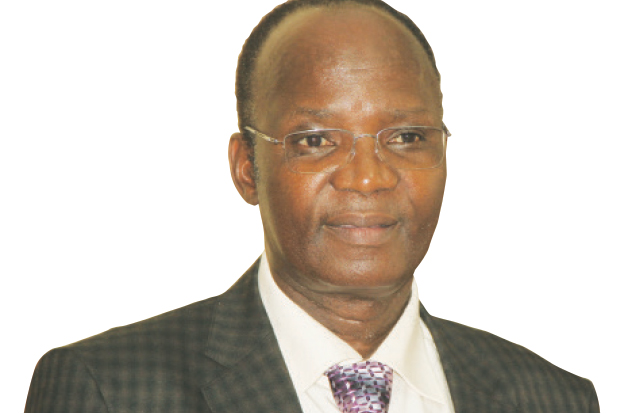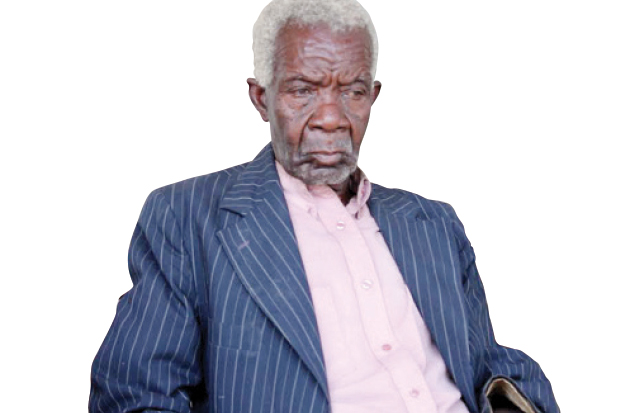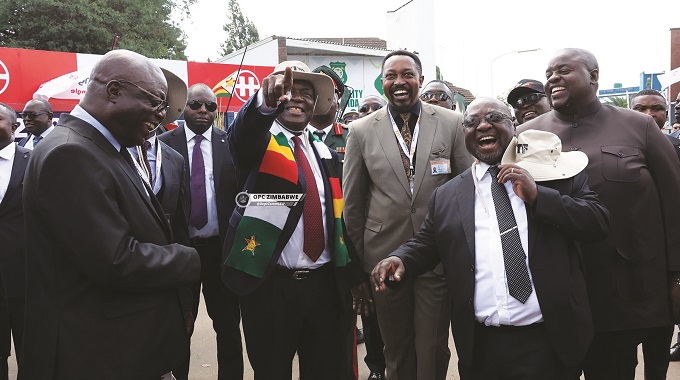Vice Presidents appointed to ‘assist’ not ‘succeed’

Nduduzo Tshuma Political Editor
GUKURAHUNDI was addressed at the signing of the 1987 Unity Accord between President Robert Mugabe and the late Vice President Joshua Nkomo, Information Minister Professor Jonathan Moyo has told the BBC.
Prof Moyo said the Unity Accord – which ended years of injudicial killings of villagers by the army in Matabeleland and the Midlands – had taught Zimbabweans to build bridges and not keep grudges.
He acknowledged that political leaders, during the period shortly after independence in 1980 right up to 1987, did and said some unacceptable things but all had been resolved after the signing of the Unity Accord.
Prof Moyo was appearing on BBC Hardtalk – the British broadcaster’s flagship in-depth TV programme presented by journalist Stephen Sackur.
Sackur had asked Prof Moyo a series of questions about Zanu-PF “succession”. He claimed Vice President Emmerson Mnangagwa was President Mugabe’s “heir apparent”, and went on to claim the VP has a terrible human rights record linked to Gukurahundi.
“That’s your view. Don’t state is as a fact. He’s a Vice President of the country, one of the two appointed by the President to assist him to implement the President’s agenda related to his pledges to the electorate. You can ask those who see him that way [as heir apparent],” said Prof Moyo.
He added: “Cde Mnangagwa is an appointed Vice President, the President didn’t appoint him so that he could succeed him; he appointed him so that he could assist him to implement the policy programme of the government.
“It’s straw man setting. You’re making a lot of assumptions without any evidence to support it. I repeat he has been appointed to assist the President. These associations you’re alleging, this is the stuff you find in newspapers.
“I want to repeat, this reference to him as the next President is yours and it’s a burden that you should unravel for yourself and not state as a fact.”
Prof Moyo said it was also a known fact to Zimbabweans that between 1980 and 1987, the country went through “a very dark period and a lot of things were done and said by elements of the political leadership including VP Mnangagwa, which were totally unacceptable.
“What I can tell you is that before he departed, the late former Vice President Joshua Nkomo, who was much more involved with these issues you’re raising than yourself or anyone else who makes reference to them, entered into a unity accord, which addressed those issues and we’ve learnt from that Unity Accord that it’s far better to build bridges than to harbour grudges. It’s not wise in politics to carry grudges with you,” said Prof Moyo.
Asked whether he was confident of a peaceful transition from President Mugabe to a new Zanu-PF leader, Prof Moyo said: “I don’t know what transition you’re talking about. It’s not like we’re a monarchy like you [Britain]. Getting into power here isn’t by inheritance, it’s by election, it’s the people.
“We’d be feeling some pressure if we didn’t have the constitutional means for acquiring power in this country. Power in this country is acquired through a democratic election and when you’ve those means in place, honestly it boggles the mind why anyone would suggest that there’s something we somehow should worry about facing us in the near future.”
Prof Moyo dismissed the notion that “succession” had become a destabilising factor in the country, saying in the July 2013 general elections, Zimbabweans had shown their confidence in the leadership of President Mugabe.
“That proposition would make sense if you weren’t looking at it against the background of a very recent election. Hardly 20 or so months ago, we had a general election and it was up to the people of Zimbabwe to address precisely that question and it’s common cause that in overwhelming numbers, they addressed that question in favour of President Mugabe, which means that as far as the Zimbabwean people are concerned, it’s about having a leader who has the wisdom to understand precisely the sort of challenges that our country faces today rather than having a leader who may be young but foolish,” he said.
Prof Moyo, asked on the potential of First Lady Cde Grace Mugabe leading party and country in future, replied: “First of all it’s a fact that she’s a leader today not in future, the position of secretary for women’s league or affairs is a leadership position in the ruling party and a senior position at that, but if you’re asking me is she a future President or some such thing, then of course you must know that it’s always the people who decide that,” he said.
Prof Moyo dismissed Sackur’s assertion that Zimbabwe’s economy was failing largely due to mismanagement in the past 15 years.
“It’s common cause known to everyone around the world that the period you’re talking about saw an unprecedented onslaught against this country,” Prof Moyo said. “The British government and its allies imposed sanctions seeking to damage the economy in the hope of causing mass disaffection against the government. They wanted a failed state in Zimbabwe but as we sit today against the background of that 15-year bad period, Zimbabwe isn’t a failed state. They wanted the President to fail, the President isn’t a failed leader.”
He rebuffed Sackur’s counter claim that the European Union had lifted sanctions against the country save for President Mugabe and the First Lady, reminding the journalist that, “this is a reality which is hardly 12 months out of a period of 15 years within which the British government and its allies systematically sought regime change here in ways that have no example anywhere in the continent.”
Prof Moyo said the country had in the past 15 years seen its citizens migrating to other country but the trend was changing, with many trekking back to exploit new opportunities. “The good news is that many of them are coming back, they’re beginning to find opportunities here and some of them are experiencing horrible conditions in some countries, most recently in South Africa where they’ve been subjected to xenophobic attacks,” he said.
Prof Moyo said he did not have a problem with South Africa with whom the country shares a liberation history, but there was need for outright condemnation of xenophobia.
“We were in the trenches together but we’ve serious problems with those lynch mobs doing what they did in full view of television cameras. If you allow that to happen without condemning it outright, without condemning it unconditionally, you sow seeds of genocide, this is a fact,” he said.
Prof Moyo said King Goodwill Zwelithini’s statements to the effect that foreigners must pack their bags and go and likening them to lice and ants stoked the xenophobic fires.
He said the government was concerned about the disappearance of opposition activist Itai Dzamara, but insisted that the disappearance of people was not unique to Zimbabwe.
In the United Kingdom, he said, individuals – some of whom would have made public statements denouncing the government – disappear only to turn up in countries like Syria, often as terrorists, without the knowledge of the British government.










Comments